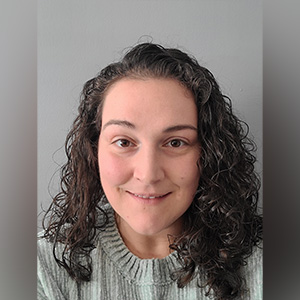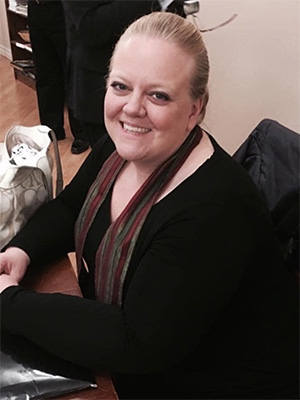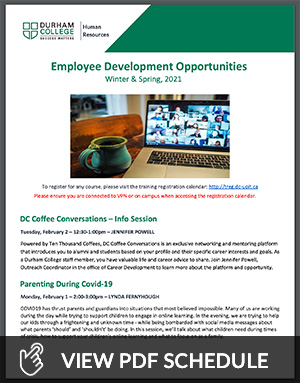|
Faculty Professional Development
|
|
Save the Date: February 24th, 2021 for CAFE Faculty PD Day with keynote speaker, Dr. Michael Ungar
|
On February 24th, the CAFE will be hosting the virtual Winter Faculty PD Day. We are pleased to welcome Dr. Michael Ungar, a renowned Canadian researcher of resilience, as our keynote speaker. His presentation, entitled Nurturing Resilience: The Personal Qualities and Social Supports Students Need to Thrive (Even During a Pandemic), will focus on providing DC faculty with evidence-based strategies to support resilience in our students and ourselves. Join us for a chance to hear Dr. Ungar and to learn with and from your colleagues.
|
|
Envision DC’s Academic Future
with Dr. Elaine Popp.
|

Executive Vice-President, Academic, Dr. Elaine Popp, will lead a featured session at our Winter Faculty PD Day. She will present our new Academic Plan and share her vision of where DC is headed!
Visit our Winter Faculty PD Day webpage to register.
|
|
Welcome Tanya Catallo, interim manager, eLearning!
|

I'm pleased to welcome Tanya Catallo to Durham College as the interim manager, eLearning at the Centre for Academic and Faculty Enrichment (CAFE). Tanya Wakelin will be on parental leave for a year until February 2022.
Tanya Catallo comes to DC with over 10 years of experience as a departmental chair and teacher at Villanova College. Tanya has deep experiences in professional development programs, collaborating with faculty as they integrate technology into their curriculum and instructional practices. She looks forward to meeting DC faculty via Teams, email and/or through PD sessions. Tanya’s email is tanya.catallo@durhamcollege.ca. Please feel free to reach out!
Jean Choi
Dean, Teaching, Learning & Program Quality
|
|
Alumni and Faculty Spotlight: "Infusing the Personable into Teaching"
|
"Don’t be afraid to be human! Everyone is trying to adapt and deal with the difficult times right now. Be honest and upfront with students. Get to know them individually - and have fun!"
|

These sage words are the apt advice from Jennifer (Jen) Braithwaite, Field Placement Facilitator in the Centre for Professional and Part-time Learning at Durham College, as we all rethink teaching and learning in a time of COVID 19.
Jen is an invaluable faculty member of Durham College, but her connection with the college runs deeper. She attended Durham College as a student in the early 2000’s and then completed a degree from Trent. When she saw the opportunity to be a part-time facilitator in the same program from which she graduated, she applied. She was thrilled to come back to the campus where she had spent many years as a student.
Jen’s own teaching practice emphasizes humanizing education; while remaining professional, she strives to incorporate humour and fun into her teaching. This approach, while also engaging students on an academic level, aids her in creating a safe, non-judgmental space for students so they feel comfortable coming to her with questions and concerns. A safe and caring environment is further developed through Jen’s methods of engaging students.
|
|
Teaching Technical - and Durable - Skills
in the Trades
|

The welding program at the Whitby campus at Durham College focuses on providing graduates with the skills to be successful in the trades; according to Gregg Peel, program coordinator, this means that the graduates need to have strong technical skills as well as strong leadership skills.
Students enrolled in the welding program are encouraged to engage in self-discovery learning. As part of their curriculum, students work on research papers in their second year that include conducting interviews with welders working in the field. This promotes an understanding of what is required to work in the field, while also developing communication skills. Further, as part of a capstone project in the program, two students are designated as peer leaders who support their classmates in developing leadership skills. Conflict resolution and mediation have also been integrated into the curriculum in order to teach students how to negotiate conflict and build positive collaborative relationships. Faculty are working in collaboration with their students, modelling the professional behaviors that are expected in the workplace.
In these times of remote delivery, faculty in the welding program are experimenting with asynchronous sessions to note what works in supporting student learning; this includes posting videos of faculty demonstrating skills that they want students to learn.
|
One of the most substantial challenges facing faculty during remote delivery relates to strategies for assessment and evaluation, and consequential concerns around academic integrity. This has opened the door for college faculty to not only revisit how assessments are being delivered, but also reconsidering the types of assessments that are used. Shifting focus from “testing for memory” to “testing for mastery” evolves our assessment practices, growing from targeting what a student can remember, to how a student can apply learning and professional resources to authentic and new contexts, and in innovative ways.
These types of assessments are often referred to as authentic assessments – where learning is evaluated based on tasks and contexts that are reflective of what would be called upon in a professional environment. One such example would be using case studies. In this type of assessment, students are permitted to use the resources they have available to apply their understanding to a specific problem or scenario (which has been historically known as an open book test). This not only demonstrates their ability to put their knowledge and learning to work in a meaningful and reflective way, but also provides them with practice accessing and leveraging professional resources. This mitigates concerns around academic integrity because they have “permission” to seek out the right answer, you can create multiple cases and distribute several versions, their responses are in their own words and submitted through an assignment submission folder, and case studies can be changed semester to semester while still drawing on the same key learning.
If you are looking for ways to migrate a formal testing approach to an alternative assessment strategy, please email Amanda Maknyik, Manager of Educational Development.
|
|
1 Minute Teaching and Learning Tip
|
We’ve all be in that crunch – trying to write meaningful and relevant questions for a quiz, test or exam. Here are a couple of tips to help take that pressure off, with the added benefit of easily growing your question bank:
- Use your students to contribute questions! At the end of your class, ask your students to write 1 MCQ and 1 short answer question on the key concepts discussed in class that day, and have them submit them to you. This is not only excellent retrieval practice, strengthening memory through active learning, but also provides the added benefit of being able to identify where concepts may have been missed or misunderstood.
- Take 15 minutes after your class to write 5-7 questions grounded in the material covered in that class (or within the asynchronous material for that week). This promotes creation of meaningful and relevant questions because the material, extensions and student questions are still fresh in your mind.
Leveraging one, or both, of these techniques will net you a substantial question bank in no time, and will take the pressure off of having to think of questions when those assessments come around.
|
If you are looking to add more dynamic and interactive content quickly to your courses, try H5P Studio. As part of eCampusOntario's open publishing tools, H5P Studio allows faculty to create a variety of activities such as drag and drop exercises, interactive images with hotspots, fill in the blank exercises, and much more with no technical expertise required! If this is of interest to you, keep an eye out and register for "Make an Interactive Activity using H5P" offered by the CAFE in the upcoming months (scroll to the end of the newsletter for PD Workshop offerings hosted by the CAFE for the month of February).
|
|
Reminder: The End of Flash Support
|
This is a reminder that as of now Adobe will no longer support Flash. This means that any interactive objects developed in Flash will no longer work on all web browsers. Please refer the CAFE blog for additional information.
|
Do you have a question about gradebook? Troubleshooting an issue regarding the Quiz tool in DC Connect? Whatever your educational technology question or concern reach out to dcconnect@durhamcollege.ca and the experts in the CAFE can support you with inquiries that you might have.
|
|
Program Curriculum Visualizations 2020
|
The CAFE’s Quality Assurance team is pleased to announce Program Curriculum Visualizations are available to academic schools and program coordinators on the CAFE Academic Quality Assurance ICE page.
These Tableau visualizations offer program teams evidence-based data (based on 2020-2021 WebCOT data) to support regular discussions regarding the accuracy and validity of current curriculum elements. These data driven discussions inform the continuous improvement of program curriculum and annual program review processes. Program Curriculum Visualizations will be updated annually for the purpose of program team review and discussion.
Questions regarding the visualizations: please contact daias.jose@durhamcollege.ca.
|
|
Student Academic Learning Services (SALS)
|
|
*NEW* Student DC Connect, Teams & Computer Support
|
SALS has expanded our peer tutoring support services in response to student needs around DC Connect, MS Teams, Virtual Classroom, and MyCampus, as well as standard computer software such as MS Word, PowerPoint, and more. Our student tutors strive to assist their fellow students in becoming confident and competent in the fundamentals of standard computer applications and navigating DC’s Learning Management System, DC Connect. Additionally, our computer tutors can support students enrolled in some of DC’s computer programs. It is recommended that student’s make an appointment, but drop-in appointments may be available. Please direct students to email sals@durhamcollege.ca for available drop-in times or to schedule an appointment.
If you missed the SALS Winter 2021 update on ICE, please feel free to access it here.
|
|
Research & Instructional Support for Winter Term
|
Please reach out to your Librarian to schedule a Library Instruction workshop or find out how to integrate the Library Online DC Connect modules into your Winter courses. Your Librarian is ready to support teaching, learning and research for you and your students. More information is available on the Teaching Support page of the Library website.
|
|
Human Resources PD and Wellness Opportunities
|

Throughout the Winter and Spring of 2021 Human Resources will be hosting Employee Development Opportunities. Take a moment to examine the sessions available to you in the flyer below or on ICE.
|
Click on the February CAFE Professional Development Calendar image below for details and to register for any of the available sessions.
|
|
|
|
|